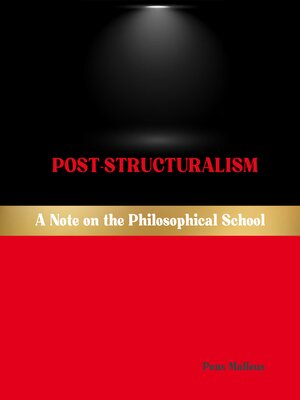Post-Structuralism
audiobook (Unabridged) ∣ A Note on the Philosophical School · Western Philosophical Schools
By Pons Malleus

Sign up to save your library
With an OverDrive account, you can save your favorite libraries for at-a-glance information about availability. Find out more about OverDrive accounts.
Find this title in Libby, the library reading app by OverDrive.



Search for a digital library with this title
Title found at these libraries:
| Library Name | Distance |
|---|---|
| Loading... |
This audiobook is narrated by a digital voice.
This audiobook is an invitation into one of the most challenging, provocative, and enduring philosophical movements of the late 20th century: post-structuralism. Emerging in the wake of structuralism's systematic approach to language, culture, and society, post-structuralism did not so much reject its predecessor as it questioned its foundational certainties. It reoriented philosophical inquiry toward ambiguity, contingency, and the instability of meaning—challenging our deepest assumptions about truth, identity, power, and knowledge.
Post-structuralism is not a unified doctrine or a clearly bounded school of thought. Rather, it is a constellation of thinkers—Michel Foucault, Jacques Derrida, Gilles Deleuze, Julia Kristeva, Jean Baudrillard, and others—each charting a unique intellectual path. What binds them, however loosely, is a shared skepticism toward totalizing narratives, fixed categories, and objective truths. Where structuralism sought underlying systems—whether linguistic, anthropological, or psychoanalytic—post-structuralism problematized those systems, demonstrating how they are shaped by historical contingencies, power dynamics, and the play of language itself.
This audiobook does not aim to simplify post-structuralism into a set of clear rules or principles, nor does it attempt to resolve its many internal tensions. Instead, it offers a guide through its core concepts—difference, deconstruction, discourse, power, subjectivity, and more—while contextualizing them within the broader intellectual and historical landscape. From Derrida's unsettling of the metaphysics of presence to Foucault's genealogies of knowledge and power, from Deleuze's philosophy of becoming to Kristeva's theories of the abject, post-structuralism offers a relentless interrogation of the categories that structure thought and society.







